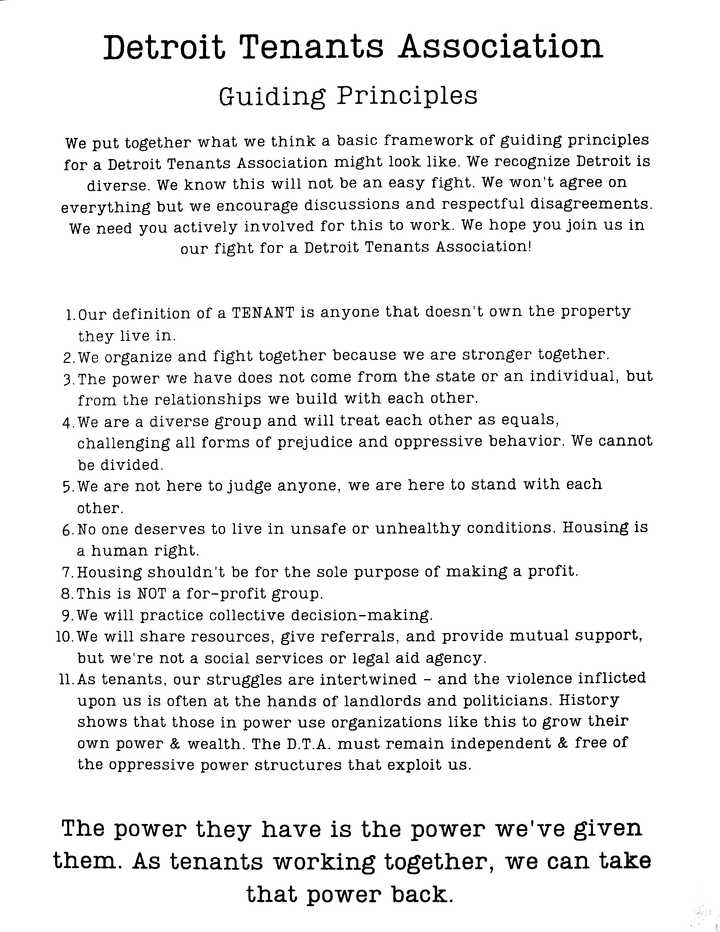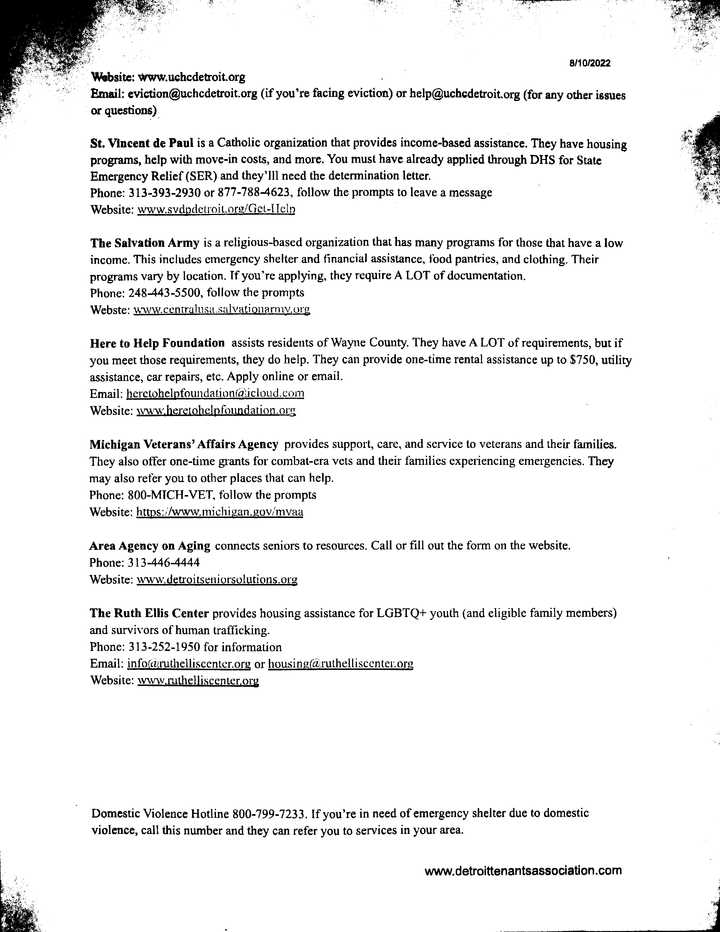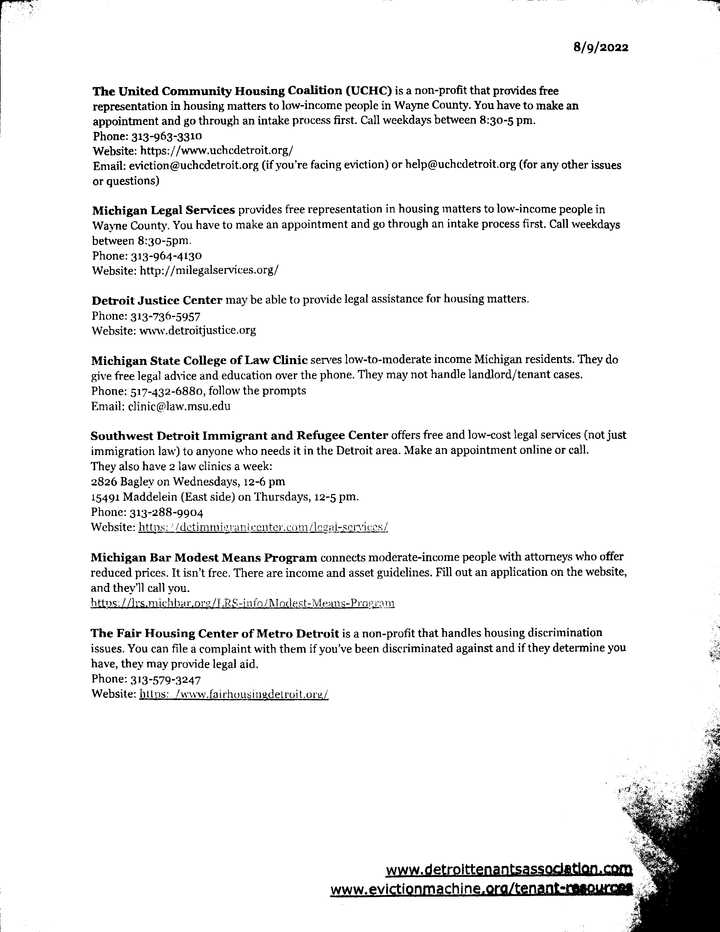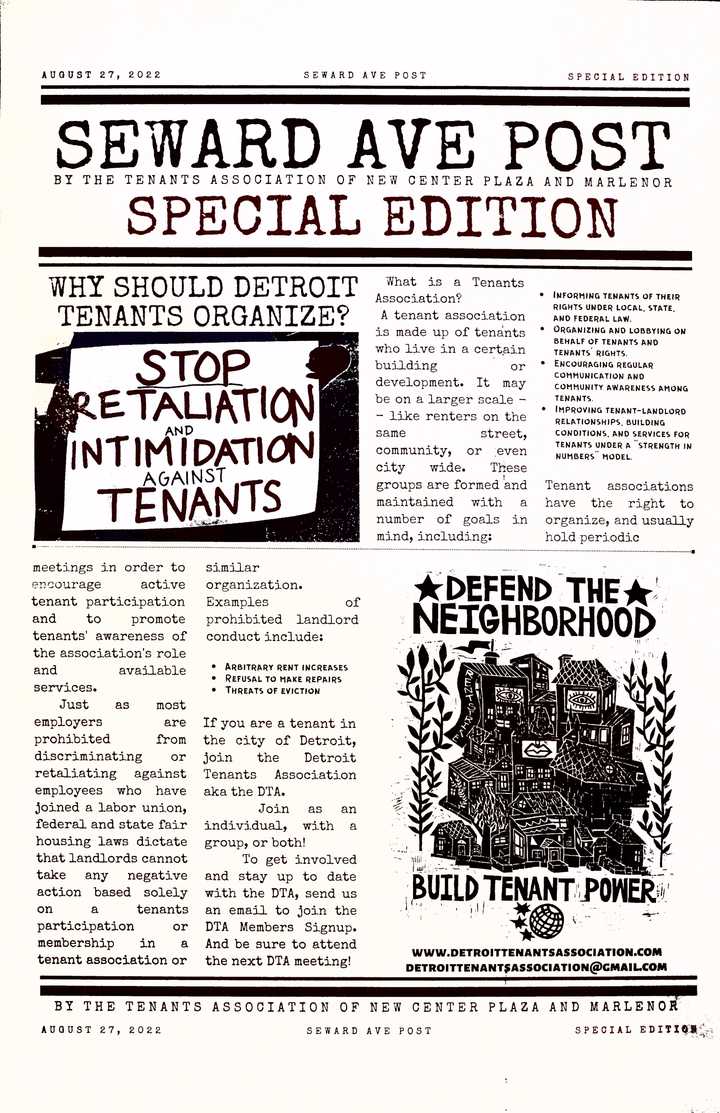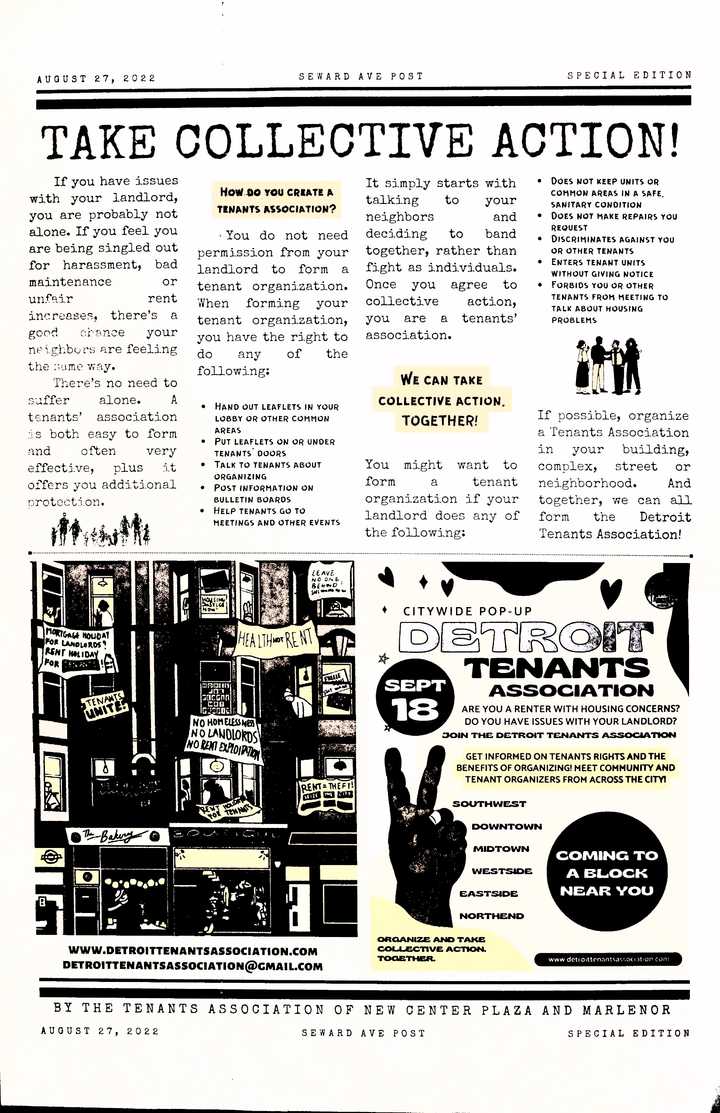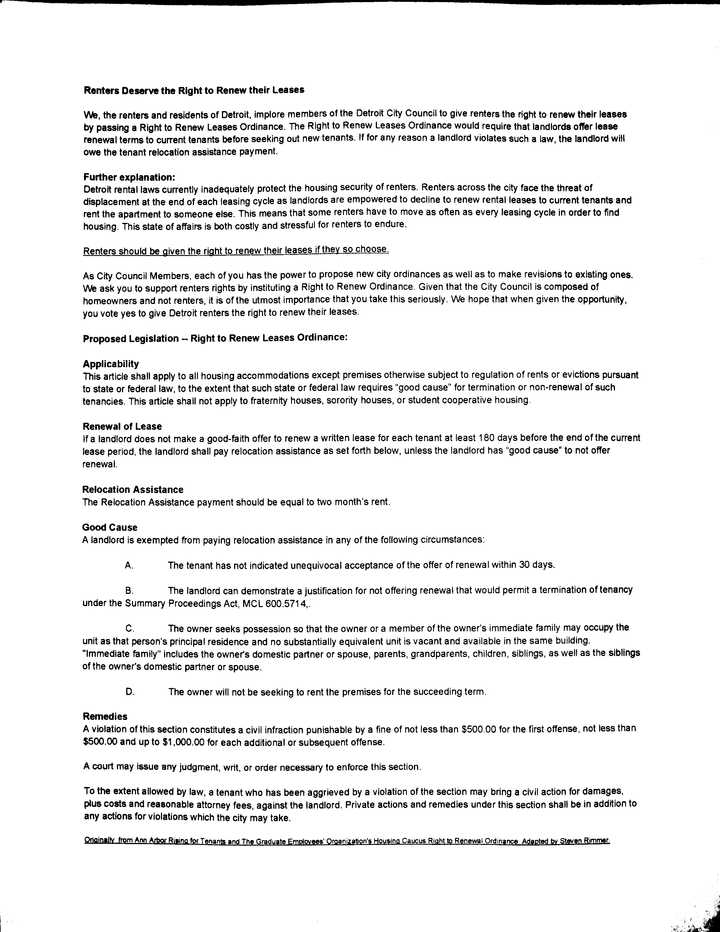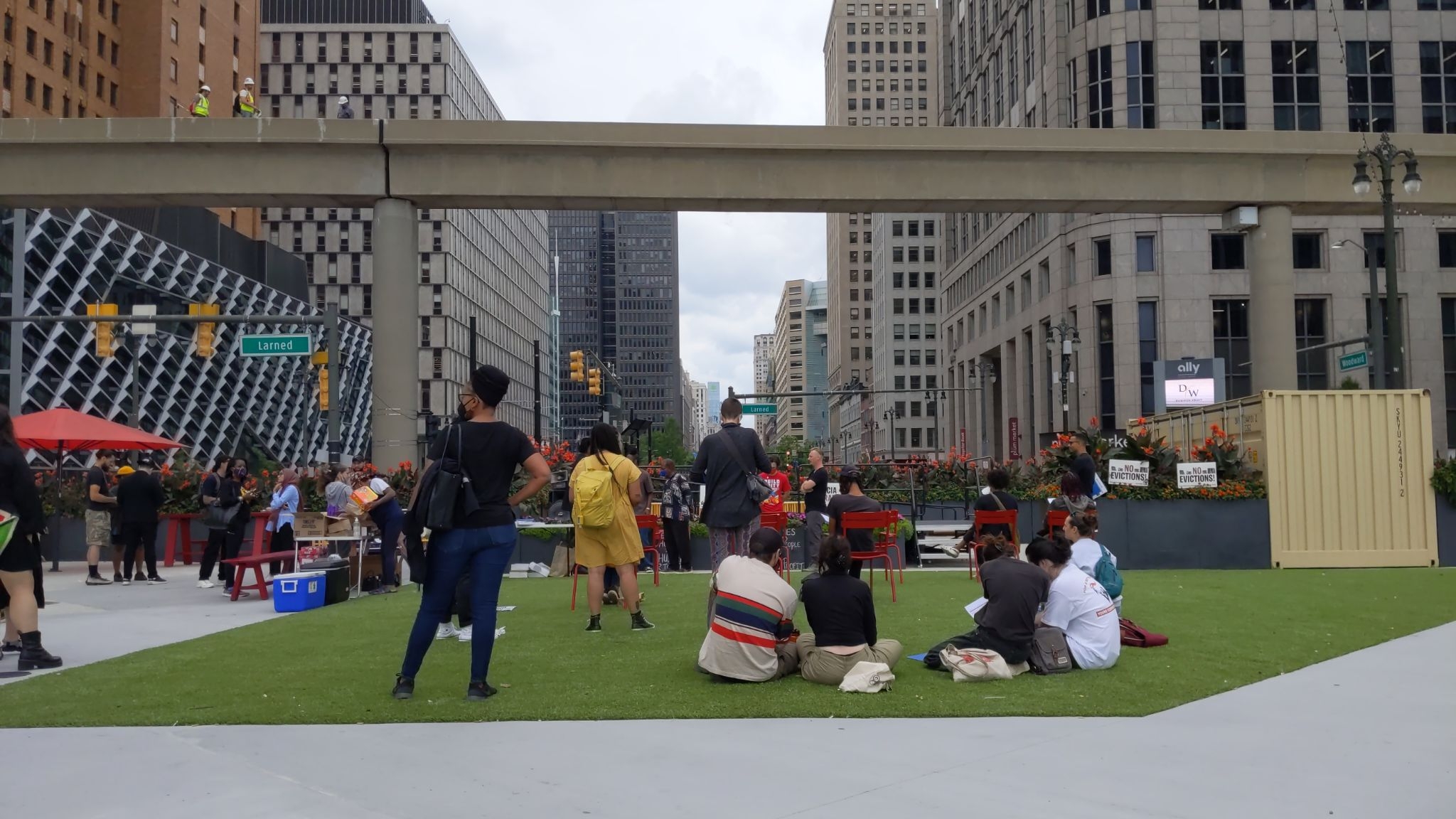
Detroit Tenants Association Citywide Orientation, 2022
“No more slumlords. We must come together and fight. We are human beings and we demand to be treated as such.”
Tenants spoke alongside organizers from Detroit Eviction Defense, Detroit Right to Counsel Coalition, Michigan District of Communist Party USA, Moratorium Now! and Tenants Association of New Center Plaza and Marlenor. Social epidemiologist Dr. Shawnita Sealy-Jefferson and Detroit City Councilmember Angela Whitfield Calloway also spoke.
Table of Contents
Documentation
The event was live-blogged on Mastodon and Twitter for Detroit Documenters, which offers its own report.
Documents available on Documenters.org, including more documentation by Calvin Walds.
The next meeting on Sept. 18 was documented by Dan Ignacio.
Visit the organization’s page for official information.
Related news articles
- “Stateside Podcast: Detroit renters are organizing”
Sept. 13, 2022, Rachel Ishikawa, Michigan Radio - “Detroit Tenants Association builds a citywide coalition pushing for renters’ rights”
Sept. 11, 2022, Nik R. Cole, The Michigan Chronicle - “Detroit Evening Report, Aug. 15, 2022: Community groups mobilize to fight for tenants’ rights”
Aug. 15, 2022, Dorothy Hernandez, WDET - “Detroit renters, housing advocates want to form citywide tenants association”
Aug. 15, 2022, Nushrat Rahman, BridgeDetroit - “Who owns rental housing in Detroit? New report offers glimpse”
Aug. 13, 2022, Nushrat Rahman, BridgeDetroit - “‘They don’t want us here.‘ Detroit tenants unite to fight rising rent costs”
Aug. 4, 2022, Alex Bozarjian, WXYZ - “Millions of dollars in rental assistance drying up — and could bring evictions in Michigan”
July 31, 2022, Nushrat Rahman, BridgeDetroit - “Rule breaking landlords could evict thousands of tenants”
June 28, 2022, Allie Gross, BridgeDetroit
Materials
Archived pages
Mastodon posts and event page are archived on the Internet Archive Wayback Machine.
Documents
Transcripts lightly edited for spelling and better compatibility with screen reader software.
Flyers
Detroit Tenants Association Citywide Orientation. Aug. 14, 2 p.m. Coleman A. Young Municipal Center, 2 Woodward, Detroit, Michigan. Free water and snacks.
Are you a renter with housing concerns? Do you have issues with your landlord? Join the Detroit Tenants Association.
Get informed on tenants rights and the benefits of organizing! Meet community and tenant organizers from across the city!
Southwest. Downtown. Midtown. Westside. Eastside. North End.
Logos for the Seward Sharing Table, Detroit Eviction Defense, East Michigan Environmental Action Council, Detroit Action, Michigan District of Communist Party USA and Moratorium Now!
Organize and take collective action. Together.
detroittenantsassociation.com.
“Detroit Tenants Association”
Who Are We?
A diverse coalition of Detroit tenant associations and working-class tenants, joined by a common need. Each association keeps their independence, but we will fight together against landlord harassment and neglect, threats of eviction, rising rents, and displacement.
Why Now?
Rents are rising faster than wages. Tenants are living in conditions no one deserves to live in. Tenants are routinely evicted and have almost no legal protections. Landlords and corporations are buying up houses and apartments, putting in the minimum amount of money for a maximum payout. This behavior has been rewarded rather than punished. As a result, this tier of rich landlords and developers has enabled an environment of the same on every level. Now, even small landlords and property managers see what they can get away with and are cashing in at our expense. And with Detroit being a majority-renter city, this means that the majority of Detroit is in a housing-insecure situation. The situation has become untenable.
Landlords, property managers, nonprofit organizations, politicians, and politically-funded groups do not share our common need. They have their own agendas. We recognize they may be allies and they may be advocates, but they can’t be members because this is a tenant-centered group.
History has taught us that movements for change are often taken over by nonprofits or politicians in an effort to use that movement’s momentum and credibility for their own purposes. In taking over, they often seek to reform when the goal is total change. Our goal is structural change because a society that has more than enough money to provide for those in need but refuses to is a society that needs to change. Safe housing that people can actually afford should not be a radical idea.
Guiding Principles
We put together what we think a basic framework of guiding principles for a Detroit Tenants Association might look like. We recognize Detroit is diverse. We know this will not be an easy fight. We won’t agree on everything but we encourage discussions and respectful disagreements. We need you actively involved for this to work. We hope you join us in our fight for a Detroit Tenants Association!
- Our definition of a tenant is anyone that doesn’t own the property they live in.
- We organize and fight together because we are stronger together.
- The power we have does not come from the state or an individual, but from the relationships we build with each other.
- We are a diverse group and will treat each other as equals, challenging all forms of prejudice and oppressive behavior. We cannot be divided.
- We are not here to judge anyone, we are here to stand with each other.
- No one deserves to live in unsafe or unhealthy conditions. Housing is a human right.
- Housing shouldn’t be for the sole purpose of making a profit.
- This is not a for-profit group.
- We will practice collective decision-making.
- We will share resources, give referrals, and provide mutual support, but we’re not a social services or legal aid agency.
- As tenants, our struggles are intertwined — and the violence inflicted upon us is often at the hands of landlords and politicians. History shows that those in power use organizations like this to grow their own power and wealth. The DTA must remain independent and free of the oppressive power structures that exploit us.
The power they have is the power we’ve given them. As tenants working together, we can take that power back.
“Need Help?”
We’ve compiled a list of third-party social service resources that may help you. It is important to contact these agencies as soon as you know you need help. We recognize these organizations are imperfect. Feel free to offer feedback on whether or not these agencies have worked for you.
It may also help to check local places of worship, they often assist community members in need. Your local library is also a great place for free wifi, public computers, and referrals to local resources. Other places that might know of agencies or programs to help you include local senior centers, local veteran centers and your local public schools.
Aug. 10, 2022.
detroittenantsassociation.com.
Feeding America
For a list of food banks and soup kitchens in your area, go to www.feedingamerica.org.
Emergency Rental Assistance Program (ERAP)
Apply on the website listed below or call them.
Phone: 833-742-1513. FYI, you may be on hold for a long time.
Website: www.waynecounty.com/rentalassistance.
United Way
Call 211 for referrals.
Website: www.mi211.org.
Detroit Housing Commission (DHC)
Provides affordable housing for low-income residents. Call to find out what programs are available such as Section 8 and vouchers. There is usually a very long waiting list.
Phone: 313-877-8000 or 313-877-8807. Follow the prompts.
Website: www.dhcmi.org.
Michigan Department of Health and Human Services (DHS)
Provides state funding for programs for low-income Michigan residents. This includes State Emergency Relief (SER), food assistance, cash assistance, etc. Apply online for benefits or contact your local DHS office. Apply as soon as you think you need benefits, sometimes the application takes a long time.
Website: newmibridges.michigan.gov.
Coordinated Assessment Model (CAM) Detroit
Provides those experiencing homelessness with access to housing resources and shelter. You’ll get faster service in person during regular business hours. Go to 1600 Porter, 48216. Veterans should go to 4646 John R, Red Tower, 2nd Floor.
Phone: 313-305-0311. Follow the prompts.
Website: www.camdetroit.org.
Wayne-Metropolitan Comunity Action Agency (Wayne Metro)
A nonprofit that serves low-income residents of Wayne County. They have programs for housing, utility assistance, et cetera.
Phone: 313-388-9799.
Email: wmconnectcenter@waynemetro.org.
Website: www.waynemetro.org.
United Community Housing Coalition
Website: www.uchcdetroit.org.
Email: eviction@uchcdetroit.org if you are facing eviction, or help@uchcdetroit.org for any other issues or questions.
St. Vincent de Paul
A Catholic organization that provides income-based assistance. They have housing programs, help with move-in costs and more. You must have already applied through DHS for State Emergency Relief (SER) and they’ll need the determination letter.
Phone 313-393-2930 or 877-768-4623. Follow the prompts to leave a message.
Website: svdpdetroit.org.
The Salvation Army
A religious-based organization that has many programs for those that have a low income. This includes emergency shelter and financial assistance, food pantries and clothing. Their programs vary by location. If you’re applying, they require a lot of documentation.
Phone: 248-443-5500. Follow the prompts.
Website: centralusa.salvationarmy.org/usc.
Here to Help Foundation
Assists residents of Wayne County. They have a lot of requirements, but if you meet those requirements, they do help. They can provide one-time rental assistance up to $750, utility assistance, car repairs, et cetera. Apply online or email.
Email: heretohelpfoundation@icloud.com.
Website: www.heretohelpfoundation.org.
Michigan Veterans’ Affairs Agency
Provides support, care and service to veterans and their families. They also offer one-time grants for combat-era vets and their families experiencing emergencies. They may also refer you to other places that can help.
Phone: 800-MICH-VET (800-642-4838). Follow the prompts.
Website: www.michigan.gov/mvaa.
Detroit Area Agency on Aging
Connects seniors to resources. Call or fill out the form on the website.
Phone: 313-466-4444.
Website: www.detroitseniorsolution.org.
Ruth Ellis Center
Provides housing assistance for LGBTQ+ youth, eligible family members and survivors of human trafficking.
Phone: 313-252-1950 for information.
Email: info@ruthelliscenter.org or housing@ruthelliscenter.org.
Website: www.ruthelliscenter.org.
Domestic Violence Hotline
800-799-7233. If you’re in need of emergency shelter due to domestic violence, call this number and they can refer you to services in your area. www.thehotline.org.
“Need Legal Help?”
Legal aid providers are present in Zoom courtrooms in the 36th District Court. It is important to attend any court hearings that are scheduled so you can access these resources.
There are not enough lawyers to represent all tenants. About 20% of tenants have full legal representation in court compared to 95% of landlords. Detroit City Council passed a Right to Counsel ordinance in May 2022 (projected start date is October 2022), but politicians have not allocated the resources necessary. We must demand that officials ensure our Right to Counsel in eviction court!
These legal service providers have limited capacities but may be able to assist you with your eviction case and/or housing needs.
Aug. 9, 2022.
detroittenantsassociation.com. www.evictionmachine.org/tenant-resources/.
Legal Aid Resources
Detroit Eviction Helpline
Detroit Eviction Helpline is a website that helps connect you with legal representation. You can reach the Detroit Eviction Helpline at 866-313-2520.
Michigan Legal Help
Michigan Legal Help is a website for people handling legal problems without a lawyer. It has many do-it-yourself tools. Additionally, there’s a Michigan Legal Help Self-Help Center in the Coleman A. Young Building, 19th floor, Room 1911. Hours are 9 a.m. to 2 p.m. You can access the website there. They have “navigators” to help visitors use the website, answer questions about court practices and answer simple questions about forms. They don’t provide legal advice.
Law Help Interactive
Law Help Interactive is a website created by the Michigan Poverty Law Program that helps you fill out legal documents for free. You will answer questions on the Michigan Legal Help website about your case which then brings you to the correct form on the Law Help Interactive site.
Legal Service Providers
Important: These providers may not answer right away and may not call back if you’ve only called once. Call them multiple times if you have to. Call, call, call until you get a response.
Lakeshore Legal Aid
Lakeshore Legal Aid is a nonprofit law firm that provides free civil legal service to people who are low-income, seniors or survivors of sexual assault or domestic violence. You can call or apply online. The hours for calling are: Mondays to Thursdays, 9 a.m. to 5 p.m.; Fridays, 9 a.m. to 1 p.m.; and Wednesdays, 9 a.m. to 6 p.m.
Phone: 888-783-8190.
Website: lakeshorelegalaid.org.
United Community Housing Coalition
The United Community Housing Coalition (UCHC) is a nonprofit that provides free representation in housing matters to low-income people in Wayne County. You have to make an appointment and go through an intake process first. Call weekdays between 8:30 a.m. and 5 p.m.
Phone: 313-963-3310.
Website: www.uchcdetroit.org.
Email: eviction@uchcdetroit.org if you’re facing eviction, or help@uchcdetroit.org for any other issues or questions.
Michigan Legal Services
Michigan Legal Services provides free representation in housing matters to low-income people in Wayne County. You have to make an appointment and go through an intake process first. Call weekdays between 8:30 a.m. and 5 p.m.
Phone: 313-964-4130.
Website: milegalservices.org.
Detroit Justice Center
Detroit Justice Center may be able to provide legal assistance for housing matters.
Phone: 313-736-5957.
Website: www.detroitjustice.org.
Michigan State University Law Clinic
Michigan State University Law Clinic serves low-to-moderate income Michigan residents. They do give free legal advice and education over the phone. They may not handle landlord/tenant cases.
Phone: 517-432-6880. Follow the prompts.
Email: clinic@law.msu.edu.
Website: www.law.msu.edu/clinics/
Southwest Detroit Immigrant and Refugee Center
Southwest Detroit Immigrant and Refugee Center offers free and low-cost legal services (not just immigration law) to anyone who needs it in the Detroit area. Make an appointment online or call. They also have two law clinics a week:
2826 Bagley St. on Wednesdays, 12 to 6 p.m.
15491 Maddelein St. (east side) on Thursdays, 12 to 5 p.m.
Phone: 313-288-9904.
Website: detimmigrantcenter.com/legal-services/
State Bar of Michigan Modest Means Program
State Bar of Michigan Modest Means Program connects moderate-income people with attorneys who offer reduced prices. It isn’t free. There are income and asset guidelines. Fill out an application on the website and they’ll call you.
Website: lrs.michbar.org/LRS-info/Modest-Means-Program.
Fair Housing Center of Metropolitan Detroit
Fair Housing Center of Metropolitan Detroit is a nonprofit that handles housing discrimination issues. You can file a complaint with them if you’ve been discriminated against, and if they determine you have, they may provide legal aid.
Phone: 313-579-3247.
Website: fairhousingdetroit.org.
“Michigan Tenants: Know Your Rights”
Available from We the People Michigan.
“Seward Ave Post: Special Edition”
By the Tenants Association of New Center Plaza and Marlenor. Aug. 27, 2022.
Why Should Detroit Tenants Organize?
What is a tenants association?
A tenant association is made up of tenants who live in a certain building or development. It may be on a larger scale — like renters on the same street, community, or even city wide. These groups are formed and maintained with a number of goals in mind, including:
- Informing tenants of their rights under local, state, and federal law
- Organizing and lobbying on behalf of tenants and tenants’ rights
- Encouraging regular communication and community awareness among tenants
- Improving tenant-landlord relationships, building conditions, and services for tenants under a “strength in numbers” model
Tenant associations have the right to organize, and usually hold periodic meetings in order to encourage active tenant participation and to promote tenants’ awareness of the association’s role and available services.
Just as most employers are prohibited from discriminating or retaliating against employees who have joined a labor union, federal and state fair housing laws dictate that landlords cannot take any negative action based solely on a tenant’s participation or membership in a tenant association or similar organization. Examples of prohibited landlord conduct include:
- Arbitrary rent increases
- Refusal to make repairs
- Threats of eviction
If you are a tenant in the city of Detroit, join the Detroit Tenants Association, also known as the DTA.
Join as an individual, with a group or both!
To get involved and stay up to date with the DTA, send us an email to join the DTA Members Signup. And be sure to attend the next DTA meeting!
Image: Woodcut illustration that says “defend the neighborhood, build tenant power” and shows an urban neighborhood with a human face made from several buildings and a banner that says “rent strike.”
detroittenantsassociation.com.
detroittenantsassociation@gmail.com.
Take Collective Action!
If you have issues with your landlord, you are probably not alone. If you feel you are being singled out for harassment, bad maintenance or unfair rent increases, there’s a good chance your neighbors are feeling the same way.
There’s no need to suffer alone. A tenants association is both easy to form and often very effective, plus it offers you additional protection.
Image: Illustration of a crowd of families.
How Do You Create a Tenants Association?
You do not need permission from your landlord to form a tenant organization. When forming your tenant organization, you have the right to do any of the following:
- Hand out leaflets in your lobby or other common areas
- Put leaflets on or under tenants’ doors
- Talk to tenants about organizing
- Post information on bulletin boards
- Help tenants go to meeting and other events
It simply starts with talking to your neighbors and deciding to band together, rather than fight as individuals. Once you agree to collective action, you are a tenants’ association.
We Can Take Collective Action Together!
You might want to form a tenant organization if your landlord does any of the following:
- Does not keep units or common areas in a safe, sanitary condition
- Does not make repairs you request
- Discriminates against you or other tenants
- Enters tenant units without giving notice
- Forbids you or other tenants from meeting to talk about housing problems
Image: Illustration of four people talking.
If possible, organize a Tenants Association in your building, complex, street or neighborhood. And together, we can all form the Detroit Tenants Association!
Image: Illustration of a mid-rise apartment building with banners hanging out every window: “Mortgage holiday for landlords? Rent holiday for tenants! … Tenants Unite! … Housing justice now! … No homelessness, no landlords, no rent exploitation. … Rent holiday for tenants. … Health not rent. … Leave no one behind! Safe housing now. … Free-ee rent. … Rent = theft! Seize the city.”
Image: Flyer that says, “Detroit Tenants Association Citywide Pop-Up. Sept. 18. Are you a renter with housing concerns? Do you have issues with your landlord? Join the Detroit Tenants Association. Get informed on tenants rights and the benefits of organizing! Meet community and tenant organizers from across the city! Southwest. Downtown. Midtown. Westside. Eastside. North End. Coming to a block near you. Organize and take collective action. Together. detroittenantsassociation.com.
detroittenantsassociation.com.
detroittenantsassociation@gmail.com.
“Renters Deserve the Right to Renew Their Leases”
We, the renters and residents of Detroit, implore members of the Detroit City Council to give renters the right to renew their leases by passing a Right to Renew Leases Ordinance. The Right to Renew Leases Ordinance would require that landlords offer lease renewal terms to current tenants before seeking out new tenants. If for any reason a landlord violates such a law, the landlord will owe the tenant relocation assistance payment.
Further Explanation
Detroit rental laws current inadequately protect the housing security of renters. Renters across the city face the threat of displacement at the end of each leasing cycle as landlords are empowered to decline to renew rental leases to current tenants and rent the apartment to someone else. This means that some reners have to move as often as every leasing cycle in order to find housing. This state of affairs is both costly and stressful for renters to endure.
Renters should be given the right to renew their leases if they so choose.
As City Councilmembers, each of you has the power to propose new city ordinances as well as to make revisions to existing ones. We ask you to support renters rights by insulting a Right to Renew Ordinance. Given that the City Council is composed of homeowners and not renters, it is of the utmost importance that you take this seriously. We hope that when given the opportunity, you vote yes to give Detroit renters the right to renew their leases.
Proposed Legislation — Right to Renew Leases Ordinance
Applicability
This article shall apply to all housing accomodations except premises otherwise subject to regulation of rents or evictions pursuant to state or federal law, to the extent that such state or federal law requires “good cause” for termination or nonrenewal of such tenancies. This article shall not apply to fraternity houses, sorority houses or student cooperative housing.
Renewal of Lease
If a landlord does not make a good-faith offer to renew a written lease for each tenant at least 180 days before the end of the current lease period, the landlord shall pay relocation assistance as set forth below, unless the landlord has “good cause” to not offer renewal.
Relocation Assistance
The Relocation Assistance payment should be equal to two month’s rent.
Good Cause
A landlord is exempted from paying relocation assistance in any of the following circumstances:
- The tenant has not indicated unequivocal acceptance of the offer of renewal within 30 days.
- The landlord can demonstrate a justification for not offering renewal that would permit a termination under the Summary Proceeding Act, MCL 600.5714.
- The owner seeks possession so that the owner or a member of the owner’s immediate family may occupy the unit as that person’s principal residence and no substantially equivalent unit is vacant and available in the same building. “Immediate family” includes the owner’s domestic partner or spouse, parents, grandparents, children, siblings, as well as the siblings of the owner’s domestic partner or spouse.
- The owner will not be seeking to rent the premises for the succeeding term.
Remedies
A violation of this section constitutes a civil infraction punishable by a fine of not less than $500 for the first offense, not less than $500 and up to $1,000 for each additional or subsequent offense.
A court may issue any judgement, writ or order necessary to enforce this section.
To the extent allowed by law, a tenant who has been aggrieved by a violation of the section may bring a civil action for damages, plus costs and reasonable attorney fees, against the landlord. Private actions and remedies under this section shall be in addition to any actions for violations which the city may take.
Footer
Originally from Ann Arbor Rising for Tenants and The Graduate Employees’ Organization’s Housing Caucus Right to Renewal Ordinance. Adapted by Steven Rimmer.
“Unlawful Eviction & Utility Access”
Available from the State Bar of Michigan.
Photos
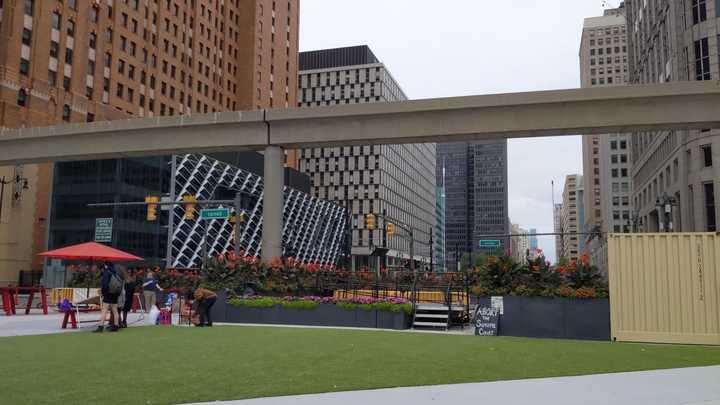
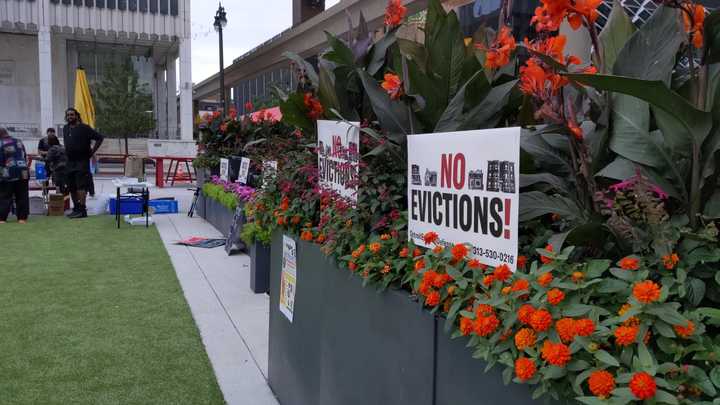
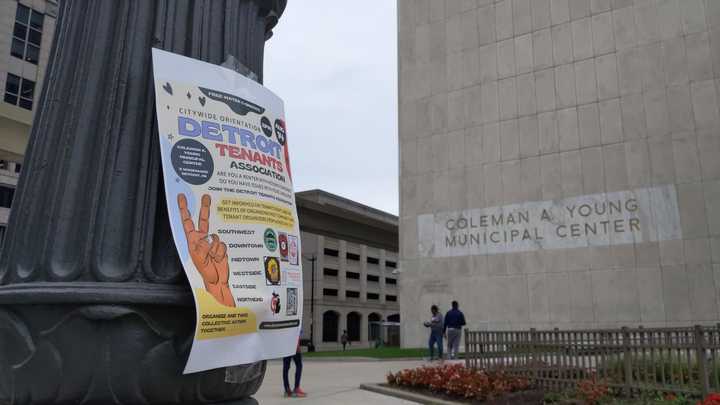
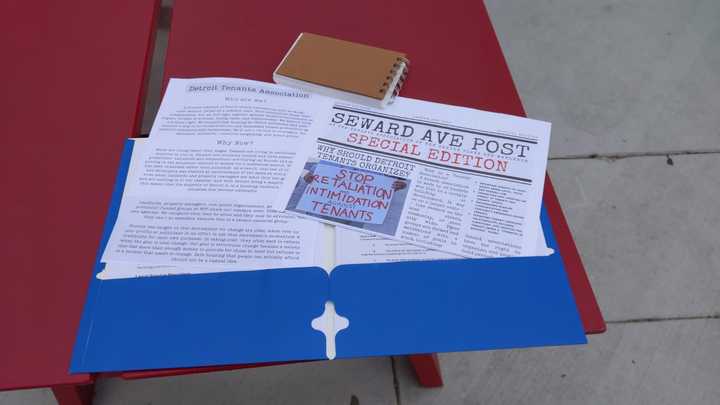
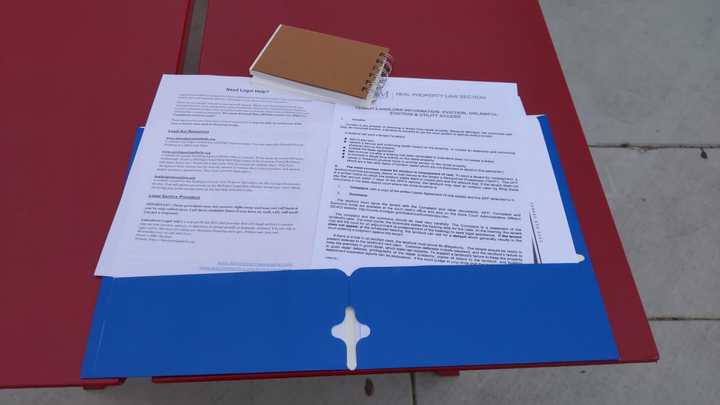
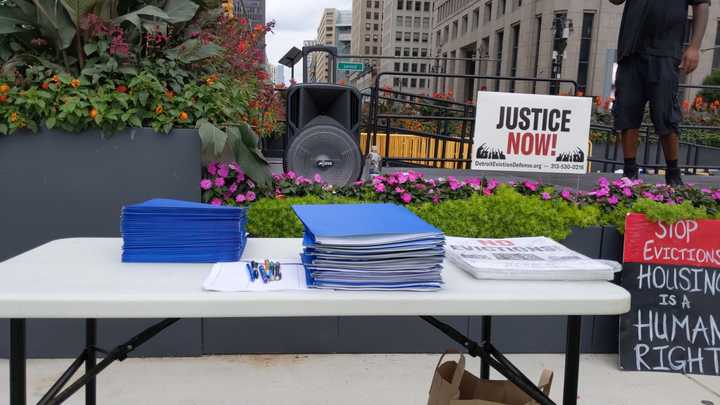
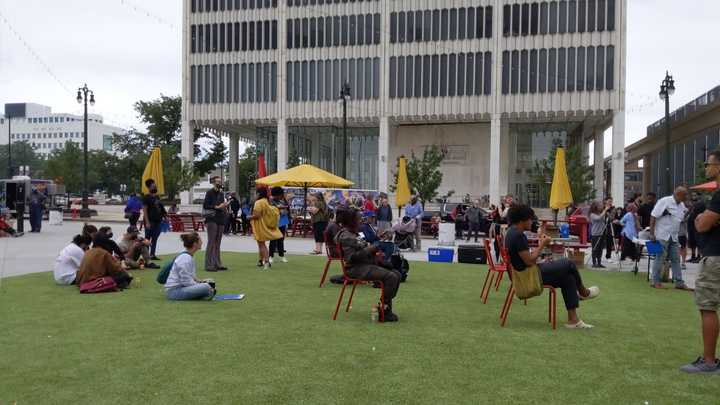
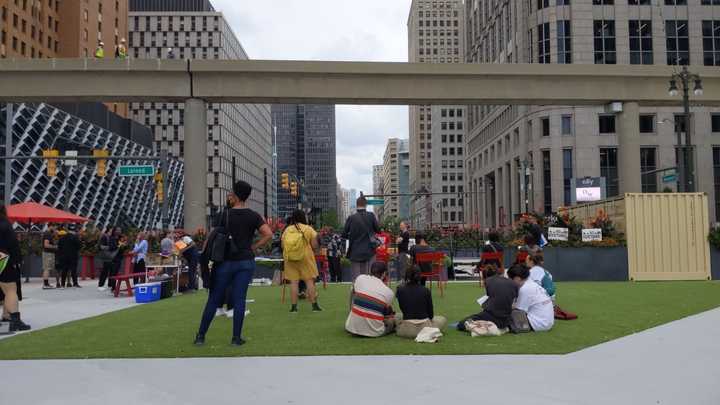
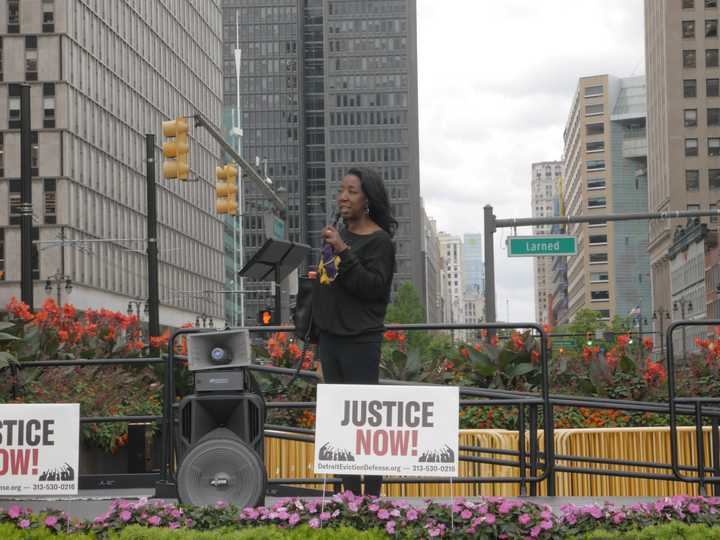
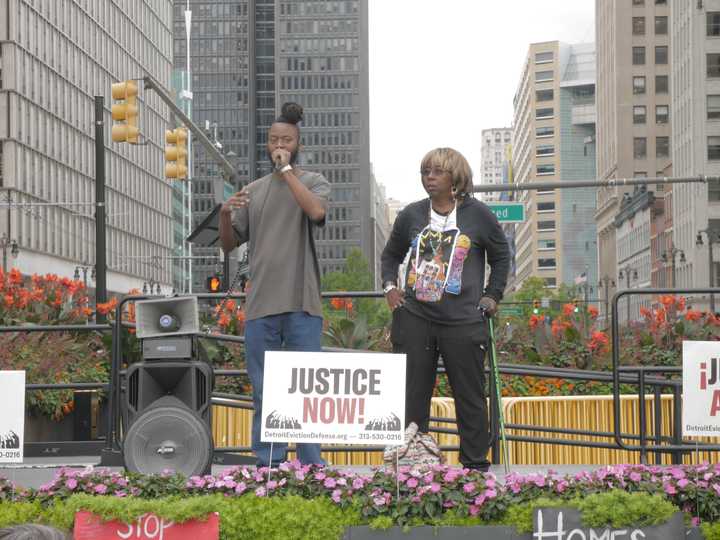
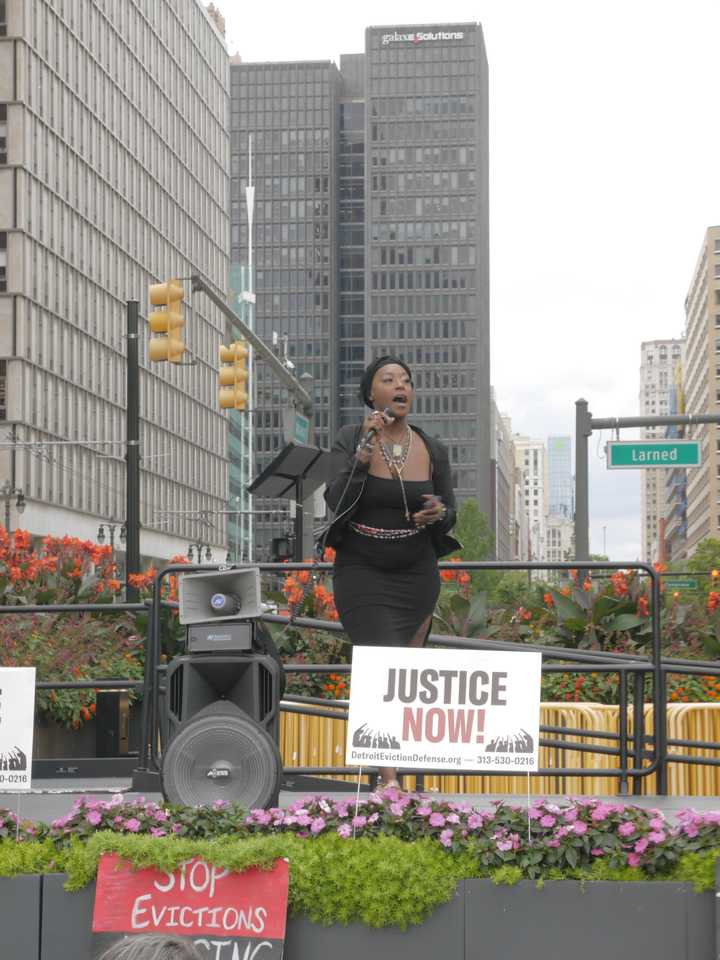
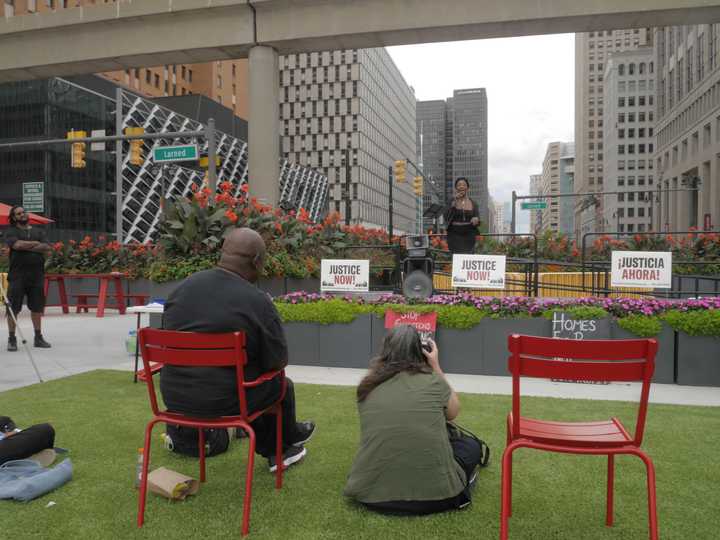
Meta
Page published Jan. 3, 2023.
Share freely
All original content in this documentation is licensed under a Creative Commons Attribution 4.0 International License. Share and republish to everyone, freely.



